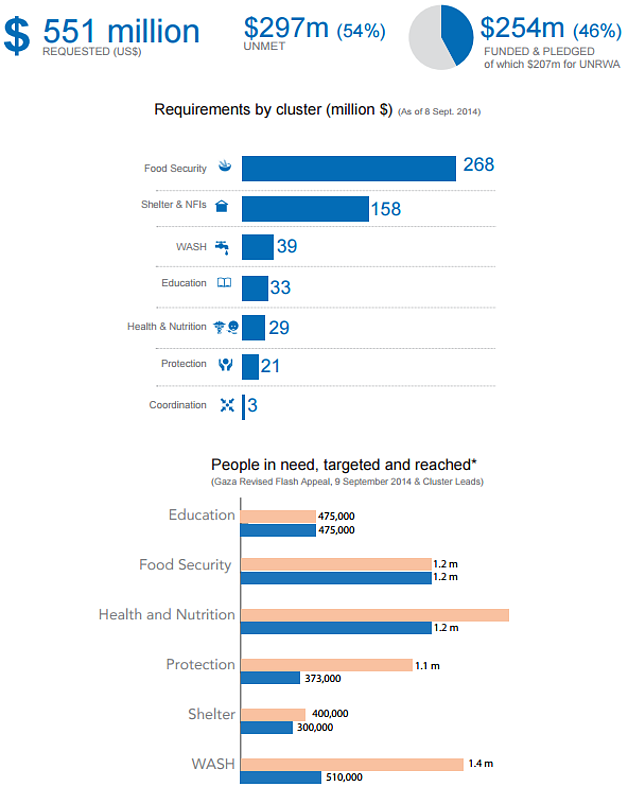The largest ever humanitarian appeal for oPt critically underfund
The bulk of the funding received has been for UNRWA
In 2014, humanitarian partners produced the largest ever humanitarian appeal for the OPT in response to the unprecedented level of human suffering and damage in Gaza following the July-August conflict. The Strategic Response Plan (SRP), which prior to the conflict stood at US $390 million, increased to $920 million following the launch of the Gaza Crisis Appeal.
Despite quick and generous contributions, the SRP remains only 46 per cent funded. The bulk of the funding received in the context of the Gaza Crisis Appeal has been for UNRWA, in particular for projects responding to food insecurity. However, funds received by the UNRWA in the context of the Appeal have been largely exhausted and, unless additional funding is delivered, cash assistance to IDPs could be suspended by the end of January 2015.
Other Humanitarian Country Team (HCT) partners have been engaged in addressing the basic needs of the most vulnerable people in Gaza, including support to basic social services that are beyond UNRWA’s mandate. Both refugees and non-refugees remain in need of critical and life saving humanitarian assistance. As in previous years, sectors such as education and WASH have suffered the most from limited funding.
Despite uneven funding, all clusters/sectors have been able to mount a partial response with the funding received:
![]() Food security: immediate food assistance provided to displaced and food insecure people, plus support to those dependent on agricultural livelihoods to restore productive capacities and prevent the complete loss of their assets, particularly seasonal and time-bound activities. The entire population has been reached in at least one type of intervention.
Food security: immediate food assistance provided to displaced and food insecure people, plus support to those dependent on agricultural livelihoods to restore productive capacities and prevent the complete loss of their assets, particularly seasonal and time-bound activities. The entire population has been reached in at least one type of intervention.
![]() Education: all of Gaza’s almost 500,000 school children have benefitted in some way from the reconstruction and rehabilitation of damaged schools, psychosocial support, or procurement of uniforms, stationery and other student supplies.
Education: all of Gaza’s almost 500,000 school children have benefitted in some way from the reconstruction and rehabilitation of damaged schools, psychosocial support, or procurement of uniforms, stationery and other student supplies.
![]() Health and nutrition: partners were able to reach some two-thirds of the total 1.8 million population targeted, whether in meeting the specific needs of trauma patients, providing access to essential health services for IDPs, or referring survivors of conflict-related violence and gender-based violence (GBV) to protection organizations.
Health and nutrition: partners were able to reach some two-thirds of the total 1.8 million population targeted, whether in meeting the specific needs of trauma patients, providing access to essential health services for IDPs, or referring survivors of conflict-related violence and gender-based violence (GBV) to protection organizations.
![]() Protection: 373,000 of 1.08 million people targeted were provided with psychosocial support to children, community-based child protection responses, Explosive Remnants of War (ERW) risk assessment clearance, disposal and awareness, the monitoring, documentation and reporting of cases and violations of international law, legal assistance and GBV responses.
Protection: 373,000 of 1.08 million people targeted were provided with psychosocial support to children, community-based child protection responses, Explosive Remnants of War (ERW) risk assessment clearance, disposal and awareness, the monitoring, documentation and reporting of cases and violations of international law, legal assistance and GBV responses.
![]() Shelter and NFIs: over half of the 700,000 people targeted were reached through interventions such as safe shelter for IDPs and provision of NFIs, temporary shelter solutions and the immediate repair and rehabilitation of shelters.
Shelter and NFIs: over half of the 700,000 people targeted were reached through interventions such as safe shelter for IDPs and provision of NFIs, temporary shelter solutions and the immediate repair and rehabilitation of shelters.
![]() WASH: 36 per cent of the 1.4 million people targeted have benefitted from household and community interventions for water for drinking and domestic use, water storage tanks and hygiene kits. Further vulnerable people have also benefitted from repairs to damage incurred to the water and sanitation network.
WASH: 36 per cent of the 1.4 million people targeted have benefitted from household and community interventions for water for drinking and domestic use, water storage tanks and hygiene kits. Further vulnerable people have also benefitted from repairs to damage incurred to the water and sanitation network.
Nevertheless, many needs remain unmet in Gaza. Priorities for the remainder of 2014 and into 2015 will continue to include effective shelter management and support for the displaced to return to adequate housing; provision of basic services; food assistance and support to those whose livelihoods were damaged, promotion of respect for international humanitarian law and human rights law; legal support; psychosocial support; and addressing the risks posed by ERWs. On an immediate basis, it will be critical to ensure that adequate winterization takes place for those living in collective centres, transitional shelters, and in damaged homes (see next section).
On 9 December, the Humanitarian Coordinator for the OPT launched the 2015 SRP in Geneva. The plan requests $705 million to implement 207 projects, addressing the needs of 1.6 million vulnerable people across OPT. Over 70 per cent of requirements are to address the continuing high levels of humanitarian vulnerability in Gaza, for which early funding will be essential.
Funding: Gaza Flash Appeal 2014
The Gaza Crisis Appeal presents the joint strategy of the humanitarian community, including UNRWA, to respond to the current crisis in the Gaza Strip. The appeal is closely coordinated with the Government of the State of Palestine, including with its Early Recovery and Reconstruction Strategy.










